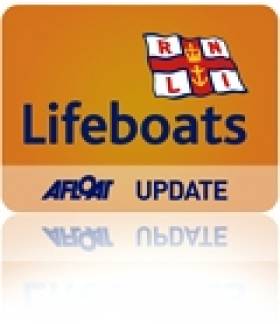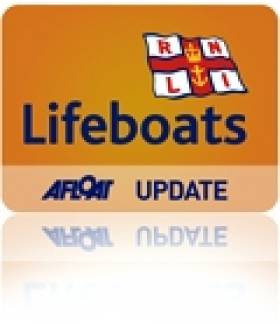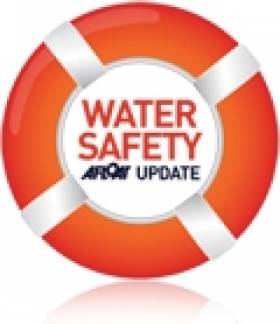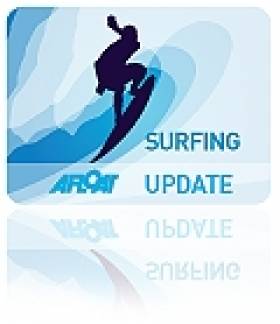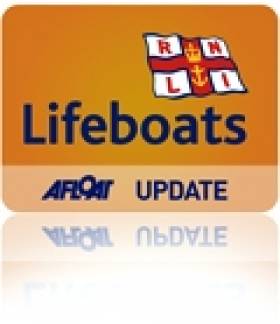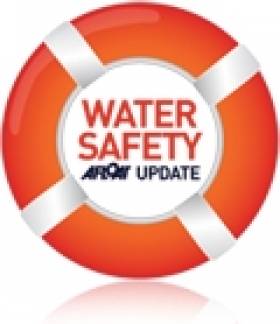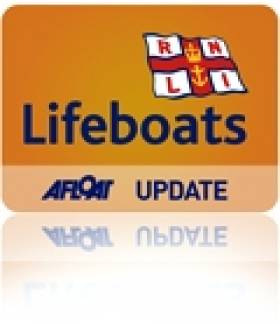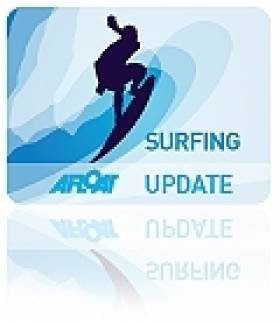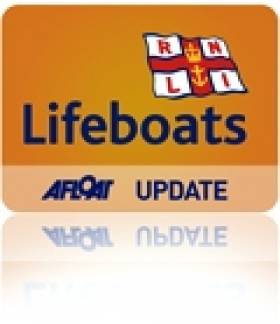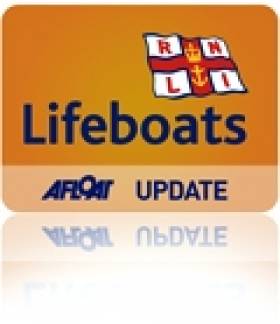Displaying items by tag: Portrush
#RNLI - Summer certainly hit Ireland's North Coast with a bang this week as temperatures topped 27 degrees, and the volunteer crew of Portrush RNLI experienced one of their busiest weeks.
On Monday 21 July, the all-weather lifeboat William Gordon Burr was launched to a motor cruiser at Lough Foyle that had run foul of a chain of lobster pots.
The crew deployed the Y boat off the lifeboat to try to free the ropes from the propeller. The mission was successfully accomplished and the cruiser sailed off to Greencastle to get checked out.
Next out was the inshore lifeboat David Roulston (Civil Service No 52), which had two callouts on Wednesday 23 July, the first around 11am to a small boat who got into difficulty at Dunluce Castle.
Luckily for the boat, a local fisherman arrived on scene at the same time as the lifeboat and towed the boat to Portballintrae.
The next callout was at 9pm, and again another local boat assisted with the small boat who had got into difficulty.
On Thursday morning at 5am, the crew of the all-weather lifeboat were paged once again. This time it was a callout to Ballycastle to assist with the search of a young person who was reported missing.
The coastguard helicopter was deployed and they soon located the young female who was successfully airlifted to hospital.
"So far this has been one of our busiest seasons as we have experienced an unprecedented good summer so our volunteer crew have been kept working," said Judy Nelson, volunteer lifeboat press officer for Portrush RNLI.
"We love to see people coming to Portrush to take advantage of everything the North Coast has to offer, but would ask people to exercise caution when on the beach.
"The RNLI Lifeguards are on patrol on all the beaches and are delighted to offer advice to visitors about safe bathing. The RNLI website will also give all the advice you need, whether it is about swimming, kayaking, surfing or boating."
#Lifeboats - Portrush RNLI's all-weather lifeboat was launched on Saturday 5 July to reports of kayakers in difficulty at the Carrick-a-Rede rope bridge.
Although the sun was shining and it seemed like a good day for kayaking, the weather conditions at sea were choppy with a southwesterly wind that picked up what Independent.ie described as a 'freak wave' that capsized the group.
Two of the kayakers ended up on the rocks at Carrick-a-Rede and the coastguard rescue team were deployed to pick them up while the Portrush lifeboat stood by to offer safety assistance.
Two of the kayaking party who tried to make it back to base were found struggling as the tide changed, and were picked up by the Portrush all-weather crew along with their kayaks.
The party and their kayaks were then transported safely back to Portrush Harbour, where the kayakers disembarked. The whole operation took approximately three hours.
Portrush RNLI had a visiting coxswain on board, Anthony Barclay from Moelfre Lifeboat Station in Anglesey, North Wales.
One of Portrush’s previous lifeboats, Richard Evans, was named after one of the RNLI’s greatest heroes, a holder of two RNLI gold medals for bravery who also hailed from Moelfre.
Barclay said: "It was a privilege to cox the Portrush lifeboat today, and myself and the crew were pleased to have brought the kayakers safely back to Portrush Harbour."
In other news from Portrush, lifeboat chair James Heaney and operations manager Robin Cardwell were presented with a lovely gift from Dorma Healey and her son Steven recently.
On behalf of the station, they accepted a silver medal belonging to Dorma's father Sam Cunningham, ex-coxswain of the Portrush Lifeboat.
The medal was awarded to Cunningham for his outstanding seamanship in the rescue of a number of Greek seamen on the ship Argo Delos, which had run aground just off Malin Head on 2 October 1960.
The rescue was long and difficult in very rough weather, and the lifeboat was on service for over 14 hours.
In all 14 lives were saved thanks to the dedicated volunteer crew of the lifeboat. Each crew member received a ‘Thanks on Vellum’ from the RNLI and special tribute, with each of the crew also receiving an engraved silver tankard in recognition from the Royal Navy's HMS Leopard, which had also helped in the rescue.
Dorma Healy was delighted to present her father's medal to the station. This medal is unique in that it comes with an identical miniature silver medal, which was presented to Cunningham’s wife Dorothy.
For this rescue, the second coxswain at that time, Robert McMullan, also received a bronze medal for his courage displayed during the rescue.
This bronze medal is also displayed in the lifeboat station and was presented by his son Robert, also coxswain of the Portrush lifeboat.
#WaterSafety - HM Coastguard has issued a safety warning over dangerous riptides along Northern Ireland's north coast this week after strong currents claimed one life and put two others at risk.
BBC News reports on the death of 25-year-old Stephen Pentony, who got into difficulty while bodyboarding off the popular surfing hotspot of Portrush in Co Antrim last Friday 16 May.
"These waters are known for rip currents," said Coleraine coastguard Chris Little, who said they "can be a very frightening experience".
Meanwhile, the Londonderry Sentinel has news of a lucky escape for two others in nearby Benone on the same day.
The two men were pulled out to sea on their personal water craft after it malfunctioned, but they managed to reach the shore with some difficulty.
One of the men was later treated in hospital.
Surfing Rises On Causeway Coast This Easter Weekend
#Surfing - The News Letter has the lowdown on this weekend's Causeway Coast Surf Festival in Portrush.
This marks the second year of the festival, hosted by the Causeway Coast Surf Club, that mixes surfing with beach and street sports plus music, film and photography, with plenty on offer to entertain the whole family over the Easter weekend.
Aside from the action on the water, highlights are set to be screenings from the Shore Shots film festival that wowed Dublin earlier this month, and a collection of classic Volkswagen camper vans.
The News Letter has more on the weekend's events HERE.
Jet Skiers Spark Portush RNLI Call Out
#rnli – Portrush RNLI volunteer All Weather Lifeboat Crew got their first service of 2014 today, after receiving reports of two jet skiers in difficulties at Benone Beach near Magillian.
The RNLI were alerted by a friend of the two men who noticed that one of the men had fallen off the jet ski into the water.
The weather was blustery and chilly and the sea was very choppy and extremely cold. The All-weather crew quickly located the two men who by this stage were very cold, as they had both been in the water for some time and neither were wearing wetsuits.
The crew got the two young men on board and returned to base were they handed the casualties over to a waiting ambulance.
The crew then returned to the area to recover the jet ski as this could have posed a hazard to other boats and vessels in that area if not recovered. This too was quickly located and a decision was made by the Coxswain to tow the jet ski to the safety of Portstewart Harbour as the surf conditions were not ideal for the Y boat (from the All Weather boat) to tow to the beach.
The crew then returned to station after a four-hour operation
Lifeboat Operations Manager Robin Cardwell commented:
'As this is the start of the summer season we are looking forward to welcoming people to enjoy the North Coast, but we would advise everyone to check their safety equipment after the winter months to make sure it is still in good condition. The Lifeguards will be back on the beaches from 18th April so talk to them before you go out. You can also talk to our crew at the station who can advise of impending weather conditions and the currents and rip tides in the area.
The crew returned to base, refuelled ready for the next shout
RNLI Surfers Survival Clinics Return To The Causeway Coast
#WaterSafety - The RNLI will host four free Surfers Survival Clinics next weekend, Saturday 8 and Sunday 9 March, on the East Strand in Portrush.
The clinics, which are run by the charity’s lifeguards, are open to surfing enthusiasts of all abilities and are aimed at developing both knowledge and skills in surf safety.
The RNLI programme, which is now being run for the third year in Northern Ireland, will show surfers how to develop their rescue techniques, learn basic first aid and surf etiquette and learn them how to help themselves and others if they get into trouble in the surf.
More people are taking to the sea every year for enjoyment and the Causeway Coast is a popular area for water sports including surfing and body boarding. The clinics have proved popular with surfers who use them as a chance to brush up on their knowledge and skills and pass on their experiences to others.
There are 10 seasonal RNLI lifeguarded units in Northern Ireland, each equipped with lifeguards ready to respond in the event of an emergency. RNLI lifeguards aim to reach any casualty up to 300m from shore within the red and yellow flags within three and a half minutes. Lifeguards are also on hand to provide advice and assistance to all water users.
Last year, Northern Ireland experienced one of its hottest summers for years and this was reflected in a busy season for the lifeguards located across the Causeway Coast in Co Down.
In all, RNLI lifeguards responded to 302 incidents compared to 159 in 2012 and came to the aid of 330 people who found themselves in difficulty, which is an increase of 153 from the year before.
The Causeway Coast, where there are seven units, was the busiest area, with lifeguards responding to 222 incidents and assisting 247 people.
Speaking ahead of next weekend’s clinics, RNLI lifeguard supervisor Tim Doran said: “Surfers of all abilities will benefit from the Surfers Survival Clinic. Amateur surfers will get the chance to learn safety skills, duck diving and surf etiquette which should help them minimise any injuries should they get into trouble.
“The more experienced surfer will be shown rescue and first aid demonstrations so that they can continue developing their skills in the surf.”
Spaces are limited for each session so advance booking is essential to avoid disappointment. Anyone who wishes to take part in the RNLI’s Surfers Survival Clinic should be aged 18. To book a space or for more information contact Tim on +44 (0) 77 899 25998.
Portrush Lifeboat Helm Trained To Help With Flood Rescue
#RNLI - Portrush RNLI volunteer Karl O’Neill is becoming one of the RNLI's all-rounders, for as well as being helm for the Portrush inshore lifeboat and senior RNLI lifeguard, he is now a part of the lifesaving charity's Flood Rescue Team (FRT).
The FRT is available 24 hours a day, seven days a week to deploy to flooding events in the UK, Ireland and abroad for search and rescue (SAR) operations.
The team comprises RNLI members from across the network who have been specially trained for the risks involved when working in or around fast moving flood water. The team are all either serving volunteer lifeboat crew or operational RNLI staff who volunteer to be part of the team.
As part of his training, O'Neill had to go to Loch Etive, near Oban in Scotland, for a period of four days' intensive training. The training exercises are designed to ensure that the team are fully prepared for dangerous and unpredictable flood waters, which differ greatly from the sea environment.
These exercises allow the volunteers to practise their skills in fast-flowing water, simulating the conditions they could face in a real life situation.
"It was a great experience to be trained for this type of emergency and has equipped me to respond in an emergency when the call comes," said O'Neill on his return to station.
"The training I had already received from the RNLI had given me a good foundation already, but the flood water training was very different to being in the open sea."
Lifeboat operations manager Robin Cardwell added that "the team at Portrush are very proud of Karl in terms of this training. He will be a great asset to any of the FR Teams when called to respond."
Karl O'Neill's family has a long association with Portrush Lifeboat Station, as his grandfather was a mechanic and cox, his uncle Anthony Chambers is the present mechanic and RNLI Bronze Medal awardee, and his cousin Jason Chambers is also on crew.
In other Portrush news, O'Neill and his inshore lifeboat crew got their first service of 2014 last Sunday (16 February) just after their usual training session, when they were called to the assistance of two surfers who got into difficulties off Portstewart Strand.
The weather was unusually mild for a Sunday in February and perfect conditions for surfing. However, the surfers were caught in strong currents and were swept out to sea.
The Inshore lifeboat quickly located the first surfer and got him on board. They then found the other surfer and, after getting him on board, transported both surfers back to the beach.
"It was a beautiful day for surfing on the North Coast but it goes to show that everyone needs to be mindful about sea safety," said Cardwell.
Funding Gives A Boost To NI's First Autism Surf Club
#Surfing - A Portrush surf school will continue its links with a programme encouraging social inclusion for people with autism thanks to a funding award from Sport Northern Ireland.
As the Coleraine Times reports, the £3,750 (€4,536) award goes to Outdoor Recreation Northern Ireland, whose partnership with Autism Initiatives NI led the latter to establish ties with the Alive Surf School, recently voted 'Best Family Activity Provider' in the OutdoorNI Awards.
That connection resulted in the North's first surfing summer club specifically for people on the autism spectrum, coming after the similar Surf2heal programme in the Republic that uses surfing as powerful therapy for autistic children.
And the new NI programme is set to continue this summer thanks to the latest funding, which has allowed for the purchase of two custom-built tandem surfboards.
The Coleraine Times has more on the story HERE.
Smiles All Round For RNLI In SOS Day Fundraisers
#RNLI - Wicklow RNLI was delighted to welcome members of the Wicklow Kilmantin Arts Group, who presented a cheque for €500 to the station last Friday (31 January).
The money was raised during a recent art auction in Wicklow, and the local artists' group wanted some of the proceeds to go to a local charity.
Mary De Courcy, chairperson of the fundraising branch, accepted the generous donation on behalf of the station.
Speaking after the presentation, Wicklow RNLI volunteer lifeboat press officer Tommy Dover said the station was delighted to receive the gift "especially on SOS Day, one of the RNLI’s main fundraising days."
SOS Day is the annual RNLI crew fundraising day and stations all over the country host innovative and novel ways of fundraising incorporating the SOS initials.
In Northern Irelabd, supporters of Portrush Lifeboat Station jumped into the sea at Portrush Harbour and swam round the station's all-weather lifeboat, the William Gordon Burr.
The weather was bitterly cold but didn’t deter the crowd that turned up to do their bit.
- RNLI coxswain Des Austin explained: "This is a fun event that involves our crew, fundraisers, and a great local crowd who turn out irrespective of the weather to support the volunteer lifeboat crew.
"The crew themselves take part and their colleagues and on standby to give them a friendly push and also to haul them in at the end of the swim."
The man with the megaphone for the event was Robin Cardwell, Portrush RNLI lifeboat operations manager. All swimmers were counted out and counted back in again.
The crew thanked Coleraine Borough Council for their use of Waterworld for everyone to get a hot shower after their swim, as well as the RNLI lifeguards and the local coastguard team, who provided safety cover for the event.
After the event everyone was treated to homemade soup and sandwiches in Portrush Yacht Club, and a special SOS cake made by crew member Claudia McAlpin.
Bushmills Anglers Raise Funds For Portrush Lifeboat
#RNLI - Portrush RNLI's volunteer lifeboat crew received a cheque for £1,052 (€1,249) from Bushmills District and Angling Club recently.
The club, which collects donations throughout the year or the lifesaving charity, made the presentation to Portrush lifeboat operations manager Robin Cardwell at the Co Antrim lifeboat house.
Club chair Vincent McLaughlin said: "Our members value the work of the volunteer crew members and when you are out on the sea, you never know when you are going to need the RNLI.
"It’s always a nice sight to see the lifeboat moored in the harbour ready to go when called. It’s a pleasure to hand this cheque over to the Portrush crew in appreciation of the work they do."
Cardwell added: "The crew really appreciate the donations from our local anglers and are delighted that year on year they continue to show us tremendous support."


























